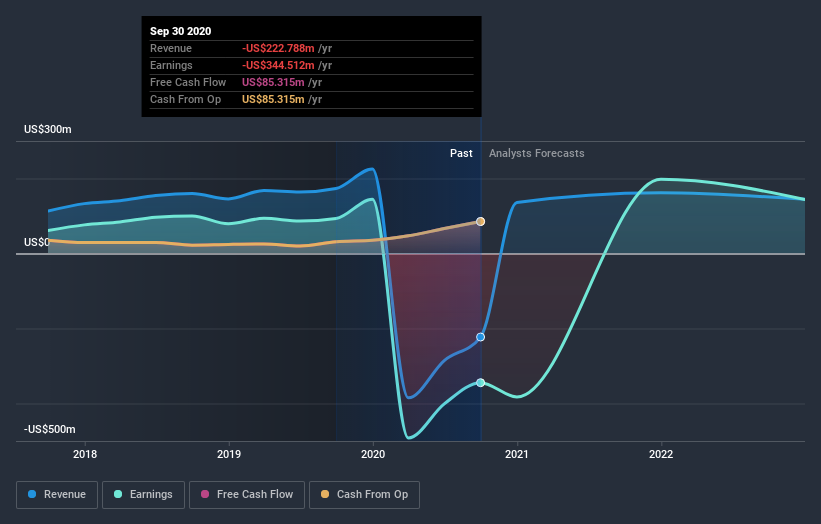- United States
- /
- Mortgage REITs
- /
- NasdaqGS:NYMT
What Kind Of Investors Own Most Of New York Mortgage Trust, Inc. (NASDAQ:NYMT)?

The big shareholder groups in New York Mortgage Trust, Inc. (NASDAQ:NYMT) have power over the company. Generally speaking, as a company grows, institutions will increase their ownership. Conversely, insiders often decrease their ownership over time. We also tend to see lower insider ownership in companies that were previously publicly owned.
With a market capitalization of US$1.4b, New York Mortgage Trust is a decent size, so it is probably on the radar of institutional investors. Taking a look at our data on the ownership groups (below), it seems that institutional investors have bought into the company. We can zoom in on the different ownership groups, to learn more about New York Mortgage Trust.
Check out our latest analysis for New York Mortgage Trust

What Does The Institutional Ownership Tell Us About New York Mortgage Trust?
Many institutions measure their performance against an index that approximates the local market. So they usually pay more attention to companies that are included in major indices.
As you can see, institutional investors have a fair amount of stake in New York Mortgage Trust. This can indicate that the company has a certain degree of credibility in the investment community. However, it is best to be wary of relying on the supposed validation that comes with institutional investors. They too, get it wrong sometimes. It is not uncommon to see a big share price drop if two large institutional investors try to sell out of a stock at the same time. So it is worth checking the past earnings trajectory of New York Mortgage Trust, (below). Of course, keep in mind that there are other factors to consider, too.

Institutional investors own over 50% of the company, so together than can probably strongly influence board decisions. New York Mortgage Trust is not owned by hedge funds. Our data shows that BlackRock, Inc. is the largest shareholder with 17% of shares outstanding. For context, the second largest shareholder holds about 5.8% of the shares outstanding, followed by an ownership of 3.3% by the third-largest shareholder.
On studying our ownership data, we found that 25 of the top shareholders collectively own less than 50% of the share register, implying that no single individual has a majority interest.
Researching institutional ownership is a good way to gauge and filter a stock's expected performance. The same can be achieved by studying analyst sentiments. There are plenty of analysts covering the stock, so it might be worth seeing what they are forecasting, too.
Insider Ownership Of New York Mortgage Trust
The definition of an insider can differ slightly between different countries, but members of the board of directors always count. The company management answer to the board and the latter should represent the interests of shareholders. Notably, sometimes top-level managers are on the board themselves.
I generally consider insider ownership to be a good thing. However, on some occasions it makes it more difficult for other shareholders to hold the board accountable for decisions.
Our information suggests that New York Mortgage Trust, Inc. insiders own under 1% of the company. It is a pretty big company, so it would be possible for board members to own a meaningful interest in the company, without owning much of a proportional interest. In this case, they own around US$9.1m worth of shares (at current prices). Arguably, recent buying and selling is just as important to consider. You can click here to see if insiders have been buying or selling.
General Public Ownership
With a 45% ownership, the general public have some degree of sway over New York Mortgage Trust. This size of ownership, while considerable, may not be enough to change company policy if the decision is not in sync with other large shareholders.
Next Steps:
I find it very interesting to look at who exactly owns a company. But to truly gain insight, we need to consider other information, too. Take risks for example - New York Mortgage Trust has 5 warning signs (and 2 which make us uncomfortable) we think you should know about.
If you would prefer discover what analysts are predicting in terms of future growth, do not miss this free report on analyst forecasts.
NB: Figures in this article are calculated using data from the last twelve months, which refer to the 12-month period ending on the last date of the month the financial statement is dated. This may not be consistent with full year annual report figures.
When trading New York Mortgage Trust or any other investment, use the platform considered by many to be the Professional's Gateway to the Worlds Market, Interactive Brokers. You get the lowest-cost* trading on stocks, options, futures, forex, bonds and funds worldwide from a single integrated account. Promoted
Valuation is complex, but we're here to simplify it.
Discover if New York Mortgage Trust might be undervalued or overvalued with our detailed analysis, featuring fair value estimates, potential risks, dividends, insider trades, and its financial condition.
Access Free AnalysisThis article by Simply Wall St is general in nature. It does not constitute a recommendation to buy or sell any stock, and does not take account of your objectives, or your financial situation. We aim to bring you long-term focused analysis driven by fundamental data. Note that our analysis may not factor in the latest price-sensitive company announcements or qualitative material. Simply Wall St has no position in any stocks mentioned.
*Interactive Brokers Rated Lowest Cost Broker by StockBrokers.com Annual Online Review 2020
Have feedback on this article? Concerned about the content? Get in touch with us directly. Alternatively, email editorial-team@simplywallst.com.
About NasdaqGS:NYMT
New York Mortgage Trust
Acquires, invests in, finances, and manages mortgage-related single-family and multi-family residential assets in the United States.
Moderate growth potential with mediocre balance sheet.
Similar Companies
Market Insights
Community Narratives



